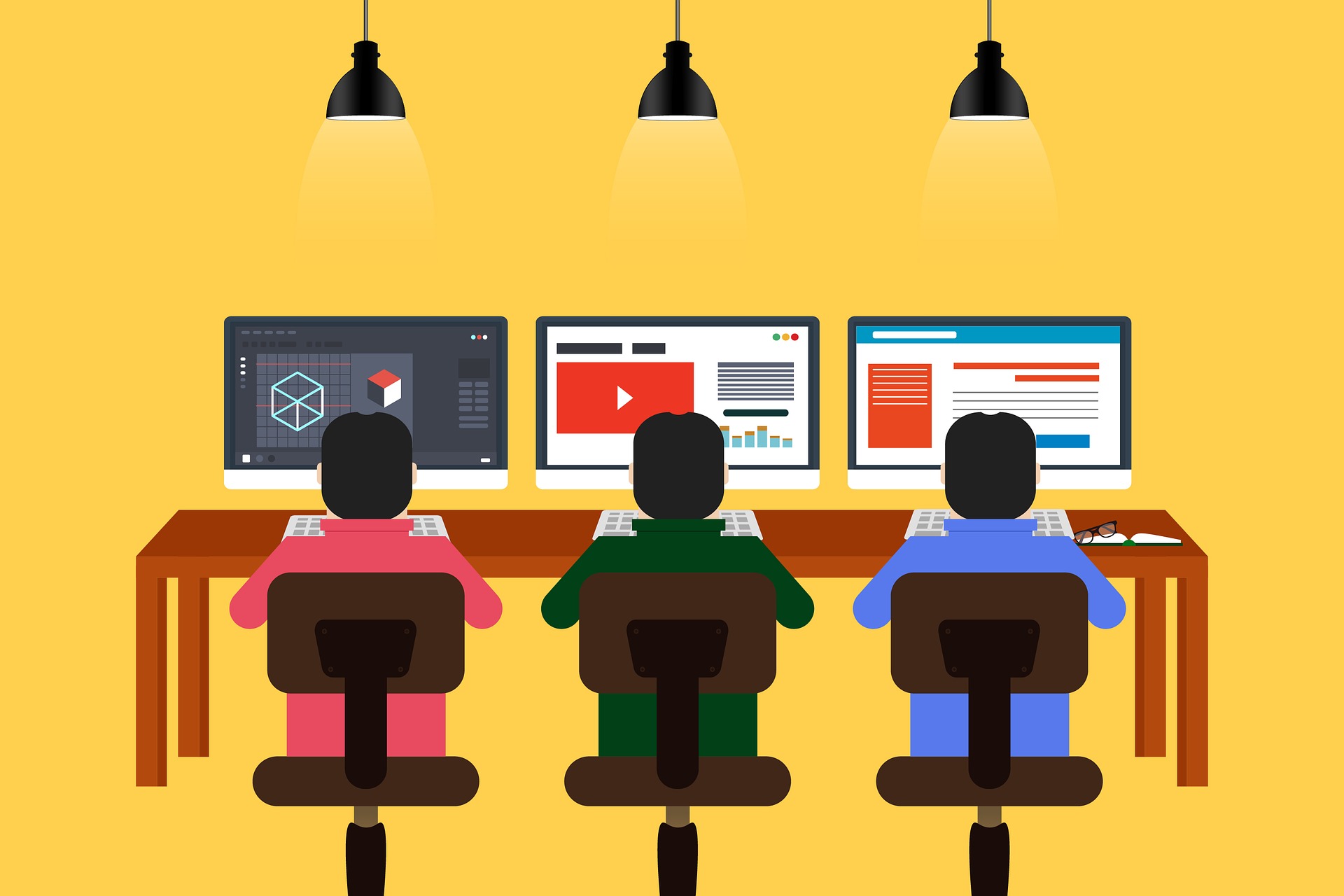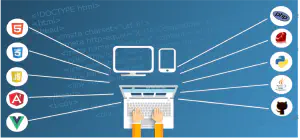15 tips to get your first programming job with no experience

You are finally ready. You worked your ass off, going through books, courses, tutorials, building projects. Now, you feel you are ready to get that first programming job. Get your foot in the door.
Chances are you find yourself overwhelmed and disappointed. After applying to dozens and dozens of job, you get zero or only a few callbacks. You start to think that all that effort is wasted.
All job posts you see require some level of experience. But, how can you get experience if you can’t get the job in the first place? This question is something that frustrates most beginners looking for their first software development job.
Why is it so hard to get first software engineering job?
It is useful to look at things from the perspective of hiring manager or business owner looking for software developer. I find this post very enlightening from the point of view of the business owner.

Getting first programming job can be frustrating
Hiring fresh grad or self-taught developer is a risk, and businesses want to reduce risk to a minimum. They want a known quantity, someone they can rely on, and the experience shows a proven track record that you can be relied on in business setting.
One more hurdle is that it takes time to hire a candidate. Most job posts get dozens of applications, and someone needs to go over them. Then they must decide who looks good on paper, and who to call for interviews. There will probably be multiple interviews before an offer is extended.
This whole process requires time and resources, which cost money. Eventually, if a person who gets hired proves to be a flop after few months, the whole process needs to be started from the beginning.
With beginners, it is hard to say whether they will be a good fit for a job, or a liability for a company. When companies do hire a junior programmer, take a risk. They bet that, with training, a person will become valuable asset to the company. And since the stakes are high, hiring managers are often reluctant.
How to increase your chances for getting the job?
Basically, there are two major hurdles that you need to overcome in order to increase your chances to get your first programming job:
Get noticed from the pile of resumes the job applications is getting
Pass the interview process itself
The first step is arguably the most important. Studies show that recruiters look at resumes for only a few seconds before they move on. So, you have extremely short time to make an impression. If you don’t, your application will most likely end up in trash.
The second step is probably more stressful, but at least it is something you can control. With good preparation, you can drastically increase your chances of passing the interview successfully.
In the rest of this post, you will find tips to help you overcome both of these obstacles.
15 tips to get first programming job with no experience
Build own projects
[Work on open source projects]((#work-on-open-source-projects)
Volunteer your skills
Start programming blog
Niche down on your job search
Tailor your resume and cover letter
Optimize your online profiles
Make your portfolio shine
Go to local tech meetups
Participate in coding challenge or hackaton
Be active in online communities
Practice live coding
Learn about the company and job position
Communication is the key
People-skills
Level up your skills
If you are looking for a software development job, chances are you have learned programming. But, simply knowing your way around few programming languages won’t cut it. You need to apply your skills in a real world to be considered as someone worth getting a shot at employment.
This section outlines some things you can do to sharpen your skills and showcase them to potential employers.
Build own projects
Building your own projects is arguably the best thins you can do to improve your resume. It gives you a chance to make real-world applications which you can showcase. And the beauty is that you get to work on what ever you want!
So, what kind of projects should you build? It doesn’t really matter, it can be as simple as complex as you want. The most important thing is that it needs to be COMPLETE.

Build personal projects to improve programming skills
If you are making a web app, it can have only one function. But, that function needs to be polished. Take these points into consideration before showing your app to potential employer:
Have a nice user interface - It doesn’t need to be particularly beautiful, just needs to make user feel comfortable. For example, if your web UI is not responsive, and user accesses application from a phone, they will hate it
Handle errors gracefully - If there is an error, show a notification to a user. There is nothing more annoying than clicking a button that doesn’t do anything, but the problem is an error in the background
Validate user input - if there is required or invalid value in the input, make user aware of it. This ranks about the same in annoyance as poor error handling
Don’t make user work to try your app - meaning, don’t just say “here is the source code, take a look at it”. Instead, package your application professionally. If it’s a web app, install it on a server somewhere. If it’s mobile, make it available in mobile store. If it’s a desktop app, make nice installer for it
Work on open source projects
This is similar to working on your own projects, but it might make you look more professional. Being a part of well known open source project carries more weight than developing some random web app nobody has ever heard of.
The caveat here is “well known” open source project. Chances are, if you are beginner coder, you will have no chance of making meaningful contributions to large open source projects. These are often developed by professional, paid by companies sponsoring the project.
On the other hand, if you work on some project nobody ever heard of, or make your own, it still doesn’t make much difference from hiring managers perspective. So, you’re basically in no-win situation again, right? Not really.
Big projects need more than just code. You can offer to write documentation, test, moderate support forums, help with build pipelines…
This will make you part of the project, and what’s more important, part of the community. You will get to know project developers, and can leverage that connection to get your foot in the door.
Volunteer your skills
Again, this is similar to working on open source projects: you donate your time and skills. But, this time you can work for charity and non-profit organizations.

Donate your time and skill to non-profits
These organizations are often run by non-technical people, often underfunded, but they still need a web site, an app for something, help with setting up servers or what ever.
Partnering with them benefit you in multiple ways: you get to do something good for the community, you improve your skills and you look as the person who cares about others.
You score multiple points with one simple move! In addition, unlike in open source projects, you will likely be the only person working on a project, so you get to decide the best approach to it.
Start programming blog
In my opinion, starting a blog is one of the best things you can do for your programming career. I regret that I didn’t start writing blog earlier in my career, but it is never too late. If you start early, it will become a habit for you.

Start software development blog
So, what is so good about blogging as a software developer? I can think of a several benefits:
You will improve communication - believe it or not, the most important thing in software development is communication. If you don’t know how to express your ideas, concerns and problems, you will suck as a programmer. Writing a blog will keep improve your writing skills, therefore making you a better communicator.
You help other people - think about all times you got stuck with a programming problem. Chances are you found an answer on a blog. Now you get to return a favor, and help somebody who got stuck with the same problem you solved and wrote about on your blog
You will improve programming skills - writing a programming blog means writing code and publishing code snippets. It will force you to dive deeper into a subject, so you can explain it better to the others
You build authority - writing consistently about a topic will make you kind of authority about said topic. Even if you are just starting out, working with a piece of technology daily, and writing about it, WILL make you an expert, and someone people turn to for advice
Make yourself standout
OK, so far we covered how to improve your skills enough to cover for lack of experience. Now that your programming chops are good, it’s time to improve your chances for jobs you apply to.
As I mentioned in previous sections, making your application stand out among the hundred others is the most difficult task. And there’s only so much you can do, because it doesn’t depend on you so much, as on the person reading the applications.
In this section, we’ll cover some tips to improve your job application status.
Niche down on your job search
First and most important tip: niche down. This means, instead of blindly sending your resume to any job post you come across, choose a specific area of software development and focus on it.
Software development is a large field. But, you can narrow it down to what you are interested in, for example “web backend”. Now you will only apply to jobs that are about web backend development.
But, you should go even narrower. Let’s say your language of choice is Java. That narrows your search down to “web backend development in Java” jobs. Further, let’s say you worked with Micronaut framework. You now narrow down your search to “web backend in Java using Micronaut”. You can see where I am going here.
You will probably have some experience with the niche you chose, probably even built a few projects with it which you can showcase to employers. This approach should make up for the lack of experience.
Tailor your resume and cover letter
What does it mean to “tailor your resume”? It basically means to customize your resume for each job application based on job description. It will greatly improve your chances of getting a job.

Resume should be customized to each job
Here are some tips on how to customize your resume for job applications:
Identify the requirements - read the job description carefully and look for clues to what are company’s needs with the job. Then make your resume reflect that. For example, if they need programmer with a feel for design, make sure your resume shows that
Identify keywords - most companies rely on automated systems to process resumes when they first arrive. These systems scan resumes for predefined keywords, and reject those that do not contain these keywords. So, look for keywords in job description and make sure you use them in your resume.
Highlight achievements - if your resume is just a laundry list of programming languages and tech specs, they are worthless to recruiters. What you need to add is what you have achieved, preferably backed up by data. For example, instead of “worked on web frontend”, better write “developed frontend which loads in 100ms”. That shows some specific achievements
Proofread everything - before you send your resume and cover letter, make sure there are no spelling or grammatical errors. You will look like you don’t care if you send a resume riddled with typos.
Optimize your online profiles
Social media are important part of people’s lives in 21 century. Likewise, they have become very important for job search.
In fact, social networks have become so prevalent that employer screen candidates social media presence in order to better evaluate them. So, keeping your social media clean is important.

Optimize social media and online profiles
For software developers, two most important online platforms are Linkedin and Github. These two are the ones your employers will most probably check.
For Linkedin, it is important to give away professional image. If you are active on the network, keep your posts professional. Do not post offensive or insulting comments. Be nice to people in conversations and never resort to personal insults, even if provoked. Remember, Linkedin is supposed to be all about business.
Github is important tool to show your code. This the best place to let interested people know that you write clean, professional code, adhering to accepted best practices.
For your public repositories, make sure there is nice README file, which gives basic information about a project, how to use it and how to ask for help.
realistically, very small number of employers will check your Github code, but in the case they do, you want it to be in good shape.
Make your portfolio shine
Your portfolio is a place where you can present your work in best possible light. You should provide a list of projects you have completed, give nice descriptions, screenshots, most notable achievements and so on.
It would be best if you have a dedicated web site as your portfolio. This way, you can simply point interested parties to it, so they can examine your work.
If you recall, I recommended starting a blog earlier in this post. This can be very powerful combination, where you make your portfolio part of the blog. With this approach, you can show both your technical and communication skills.
Network, network, network
Looking for jobs online is how most of us search for jobs. But, it is the least effective way.
In fact, the most efficient way to get a job is to have a recommendation from somebody you know. This can help you avoid several steps in the process and get directly in touch with the hiring manager.
To make this happen, you need to know the right people. You need a network
Go to local tech meetups
Chances are there are tech meetups on your community. Meetups can be a great place to meet like-minded people who are interested in the same technology as you.
If there are meetups organized by the companies you would like to work for, that can be a great opportunity. You get to chat with people who actually work there, so you can learn in detail how it is working for the company.
If you are lucky, you might even hear about opportunities which you can’t find online.
Participate in coding challenge or hackaton
Established companies often organize hackatons or coding challenges. The good thing about these events is that you can demonstrate your coding skills, as well as meet new people.
If you ever apply for the job in organizing company, chances are you will have the beneficial treatment.
Be active in online communities
Being active in communities like Stackoverflow or Quora, answering to programming questions, is good for building your reputation. Famous Robert C. Martin (Uncle Bob) is known for being extremely active member of Stackoverflow.
If you recall, earlier in the post, I recommended being active in community of open source projects. Coupled with activity in online communities, it can greatly boost your credibility.
And if you also have an active blog, you are on fire!
Ace the interview
With all the preparatory work done, you are now at the last step: the interview itself.
Although this probably the most stressful and frustrating part, it’s arguably the easiest because here it all depends on you. If you prepare good, you should be able to pass the last hurdle.
Practice live coding
The worst part with programming interviews is that they are unnatural. Instead of working alone at your computer, you code on a whiteboard, with people looking over your shoulder. Or if it is online, you work in a shared editor, again with people looking at you sweating.

Live coding can feel like school again
One important thing about live coding tests is that interviewers don’t care too much about the correctness about your solution. It’s more about the way you think. About the communication.
If you just write down a solution on the board without saying a word, you give the interviewers nothing. They want to see the process, how you get to the solution. You need to talk about what are you doing and why. Don’t be afraid to ask questions if you need to clarify something.
Since live coding is so much different than actual coding, you need to practice it. Get a white board and practice writing code, while talking about it out loud.
Learn about the company and job position
Interview is a two way street. Interviewers want to learn about you, but they also expect you to be interested in a company and what you will be working on.
Before you go to the interview, learn as much as you can about the company. Check out their website, social media, company reviews online. They can be valuable sources of information about the people you will be working on.
This is also your opportunity to ask questions you are interested in. For example, about their tech stack, their work process, team you will be working with and so on.
Don’t be afraid to ask anything you want to know, since any decent company would love to tell you that.
Communication is the key
I mentioned several times in the post about the importance of communication. It is even more important during the interview. Here are some tips about improving your communication during interview:
Don’t be afraid of small talk - interviewers are people too. Nobody minds a little small talk as a warm up before conversation
Follow interviewers style - if interviewer is casual, you should be too. On the other hand, if atmosphere is formal, you should play along
Don’t interrupt - interrupting people is rude. Wait for the interviewer to finish before replying
Don’t forget people skills
In a software development job, you will be working with people. So, people skills matter. Here are some tips to keep in mind for the interview:
dress appropriately for the occasion
don’t neglect your personal hygiene (you won’t believe how big of a problem this can be)
be polite to other people
Final thoughts
This is it, all the advice I have for landing that first software development job. I hope it will be helpful.
I would love to hear your thoughts about this topic. Please feel free to add a comment using the form bellow.


